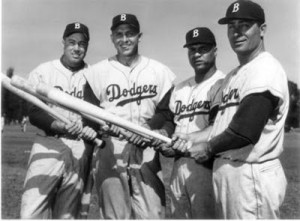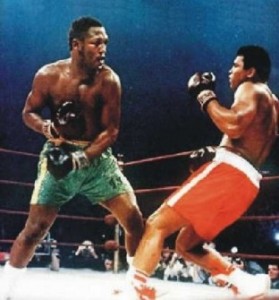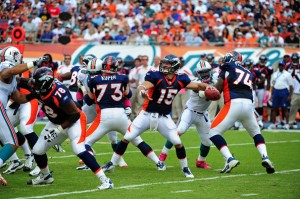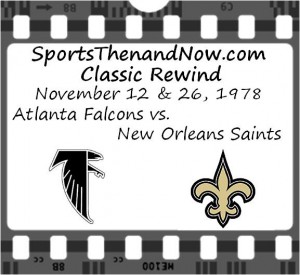Posted on
December 07, 2011 by
Jena Ellis

Despite having many of the top stars in Major League Baseballs, the Brooklyn Dodgers won only one World Series title.
Now that the 2011-12 NBA season will happen, sports prognosticators will return to projecting how many championships the Miami Heat will win. Forget about the disappointment of last season — this team has more than enough talent to bring home at least a few Larry O’Brien Trophies, right? That’s what people were saying about the Lakers in the ’60s, Mets in the ’80s, and Mariners in the ’90s (different trophies for the latter two, of course), yet they wound up with just two championships between them when all was said and done. The following would-be dynasties failed to meet expectations for a multitude of reasons — including injuries, team chemistry problems, free agency, drugs, and even a strike — leaving fans wondering what might have been had things gone a little differently.
1940s and ’50s Brooklyn Dodgers
Even if the Dodgers had won multiple World Series titles during this era, the franchise would’ve been more remembered for its role in integrating baseball by signing and promoting Jackie Robinson. More than just an inspiring figure in the Civil Rights Movement, Robinson was an ideal second baseman with tremendous speed, excellent contact ability, and exemplary defense. He played alongside Hall of Famers Roy Campanella, Duke Snider, Pee Wee Reese, Don Drysdale, and Sandy Koufax, one of the most talent-rich rosters in baseball history. From 1947 to 1956, the team won six NL pennants and the 1955 World Series, a resume worthy of NL dynasty status, but not MLB dynasty status.
1960s and ’70s Los Angeles Lakers
Before the Buffalo Bills, there were the Lakers. Sure, they had already won four of the first 10 NBA championships, but, with seven Finals losses in nine seasons during the 1960s and ’70s, they were the original poster child for second best. The primary culprit for their failures was the Celtics, who reeled off a remarkable 11 championships in 13 seasons. The Lakers also faced a 76ers team with perhaps the most dominant player off all time, Wilt Chamberlain, and a hungry Knicks team led by Willis Reid and Walt Frazier. When management figured out the mere presence of Jerry West and Elgin Baylor wasn’t enough, it added an older but still effective Chamberlain. The team finally got over the hump in 1973, after Baylor retired and Gail Goodrich had been added to the roster. Read the rest of this entry →
Tags: Atlanta BravesBrooklyn DodgersHakeem OlajuwonKen Griffey Jr.los angeles lakersRalph SampsonSeattle Mariners
Category
Baseball, Basketball, Football, General, Great Moments, NBA, NFL, Sports History
Posted on
November 11, 2011 by
A.J. Foss
In 1978, the Atlanta Falcons and New Orleans Saints were unlikely contenders for a playoff spot in the NFC as both teams had never made the playoffs in their collective 23 seasons between the two teams.
The two divisional rivals meet twice over a span of 14 days in November 1978 in a pair of last-second finishes that determined both teams’ fates for the 1978 season.
The Falcons entered the first game with the Saints on a four-game winning streak to up their record to 6-4 to put themselves in the hunt for their first playoff berth in franchise history.
Atlanta was led by head coach Leeman Bennett, who was in his second season as the Falcons head coach, and featured a defense that called “The Grits Blitz” which had allowed a NFL-record 129 points in 14 games in Bennett’s first season, only to have the team finish 7-7 because of an offense that only scored 179 points.
While their stats were not that much better in the 1978 season, the Falcons offense with quarterback Steve Bartkowski at the helm was doing enough for the Falcons to win games. Read the rest of this entry →
Tags: Archie ManningAtlanta FalconsNew Orleans SaintsSteve Bartkowski
Category
Classic Rewind, Football, General, Great Moments, NFL
Posted on
November 08, 2011 by
Dean Hybl

Joe Frazier defeated Muhammad Ali in the "Fight of the Century" in 1971.
The boxing world lost one of its greatest champions Monday night with the death of former Heavyweight Champion Smokin’ Joe Frazier at the age of 67 following a brief battle with cancer.
Though he is probably best known for losses in the ring to Muhammad Ali and George Foreman, Frazier did defeat Ali in the “Fight of the Century” and was a key figure in what could be considered the greatest era in modern boxing history.
In the 1970s, being the Heavyweight Champion of the World was as important a title as any in sports. From humble beginning, Frazier went on to proudly hold the undisputed title for nearly three years.
Born and raised in Beaufort, South Carolina, Frazier moved to New York in 1959 and soon became one of the top amateur fighters in the Northeast. He won the Middle Atlantic Golden Gloves heavyweight championship three straight years from 1962-64 and was the only American boxer to win a gold medal at the 1964 Olympics.
When Muhammad Ali was stripped of his heavyweight crown in 1967, Frazier was among several boxers who stepped into the mix. Read the rest of this entry →
Tags: Joe FrazierMuhammad Ali
Category
Boxing, Great Moments, Sports History
Posted on
October 23, 2011 by
Dean Hybl

In his first start of the season Tim Tebow led the Denver Broncos to victory over the Miami Dolphins.
Okay, perhaps that headline is a bit premature given that Tim Tebow just made his first start of the 2011 season and fourth of his career, but since so many NFL “experts” have been lining up since before he had even played an NFL game to predict that he would be a bust, it almost seems appropriate after his fourth quarter performance in Denver’s overtime victory in Miami to proclaim him as an all-time great.
The reality is that we don’t yet know whether Tim Tebow will be a great NFL quarterback, but it is up to Tebow and the Denver Broncos to find out and not former players or others who are quick to judge without giving him a chance.
Denver Head Coach Mike Fox is giving Tebow a chance and after looking like a young quarterback making only his fourth NFL start early on, Tebow did what he has done best throughout his career, he made the big plays when needed down the stretch to lead his team to victory.
Critics of the second year quarterback will be quick to point to the first half where he passed for only 24 years and Denver was held scoreless, but it should be noted that kicker Matt Prater missed a pair of makeable field goals (40 and 43 yards) that would have matched the first half point total for the Dolphins and ultimately may have kept Denver from needing overtime to win the game.
For some reason, many former players that are now earning their living analyzing the game have been unwilling to give Tim Tebow time to develop as an NFL quarterback. I find it ironic considering that many of them needed time themselves before they enjoyed NFL success.
One of the most vocal critics of Tebow has been former Pittsburgh and Chicago running back Merril Hoge. He has regularly said that Tebow will never be an NFL star and in the preseason was even quoted as saying that it would be “embarrassing to think that the Broncos with Tebow could win.”
Given how his career began, Hoge should be really glad that Chuck Noll didn’t come to similar conclusions about him without giving him a chance to show his stuff. Read the rest of this entry →
Tags: Denver BroncosMerril HogeTerry BradsawTim Tebow
Category
Football, Great Moments, NFL, Sports History
Posted on
October 22, 2011 by
Jena Ellis

The Princeton football program was once more dominant than USC, Alabama or Florida have been in recent generations..
College sports fans often complain about the disparity between the “haves” and “have nots.” In college football, Alabama, Notre Dame, USC and Oklahoma own a bulk of the national titles from the last 90 years. In college basketball, UCLA, Kentucky, Duke, North Carolina, Indiana and Kansas are the dominant six that have presided over the sport over last several decades. While parity may never truly take hold, the powerhouses will likely change over time, as evidenced by the examples of former powerhouses provided below. These programs aren’t nearly as dominant — or nearly as relevant — as they were years ago, but they’ll always have those glory years in which they immeasurably contributed to the evolution of major college athletics.
Princeton Tigers football
With 28 claimed national titles, even Alabama fans are taken aback by Princeton’s early dominance. The Tigers were early adopters of the sport, a variant of rugby, participating in the first-ever football game against Rutgers on November 6, 1869. They lost 6-4, but won the rematch a week later, leading to a split of the first national title. During the first 40 years of college football, the Tigers won 22 national titles, an era of success unparalleled by any other college athletic team — save for their rivals at Yale. Their last national title came in 1950, which was followed by Dick Kazmaier’s Heisman Trophy-winning season in 1951, the only time a Tiger has won the award.
Yale Bulldogs football
During the late 19th century, college football became more structured, closer resembling the sport we know today. Head coaches were being hired for the first time, perhaps the most notable of which was Walter Camp, the “Father of Football,” who finished his playing career at Yale six years before he was hired. He tallied a 67-2 record at the helm, capturing three national titles. None of his successors lost more than two games until 1914, 22 years after he left the program. The foundation he nurtured is the primary reason Yale ranks second all-time in wins behind Michigan, boasts 28 College Football Hall of Fame inductees — such as Amos Alonzo Stagg — and two Heisman winners.
Harvard Crimson football
Yale’s archrival isn’t quite as accomplished, but possesses a rich history of success consisting of 12 national titles and 20 College Football Hall of Fame inductees. Although the Crimson’s last claimed national title came in 1920, a year in which it defeated Oregon in the Rose Bowl, it remains the eighth winningest program in college football history. Their most cherished wins have come in “The Game” — though they trail the series 54-65-8 — which has been played since 1875, making it the second-oldest continuing rivalry in college football. Many of the sport’s rules and traditions were born during the yearly event. Read the rest of this entry →
Tags: Bill RussellChuck BednarikCollege BasketballCollege FootballJay BerwangerPrinceton TigersSan Francisco DonsYale Bulldogs
Category
Basketball, College Basketball, College Football, Football, Great Moments, Sports History
Posted on
October 15, 2011 by
Dan Flaherty

The Red Sox & Angels staged a historic battle for the AL pennant 25 years ago this October.
It’s League Championship Series time right now in major league baseball, a time the people of Boston were able to get very used to in recent years, with four appearances in six years from 2003-08. The Sox also made this round in 1999 and prior to that the legendary (or infamous, depending on your point of view) team of 1986 played for the pennant. With this being the 25th anniversary of the ’86 Sox, let’s take a look back on the epic seven-game war they waged with the then-California Angels for the American League flag.
Boston and California had each put away their division titles without drama (from 1969-93 the leagues were split into just two divisions with only the winners advancing straight into the LCS) and the Game 1 showdown of Roger Clemens and California’s Mike Witt was highly anticipated. Clemens had just completed a regular season that would win him the Cy Young and MVP award and Witt was easily the ace of the Angel staff. The series got off to a less than auspicious beginning as the Halos got four runs in the second inning. First baseman Wally Joyner, who’d already greeted Clemens with a double to right in the first, got up again in the second and doubled the other way to pick up two of the runs. Staked to a 4-0 lead, Witt never looked back and the Angels cruised to an 8-1 win. It gave California their goal of just taking one game at Fenway. The Red So were able to bounce back with a 9-2 win in Game 2. This game was closer than the score made it look, as Boston held a 3-2 lead after six and Fenway had to be a very jittery place, particularly when Bill Buckner missed a chance to put the game away early when he grounded into a bases-loaded double play. Ultimately though, three runs apiece in both the seventh and eighth opened the game up and sent the series west knotted at a game apiece.
The three games in Anaheim were all outstanding games, gradually building to the one that would ultimately give this ALCS a storied place in baseball lore. Boston’s Oil Can Boyd pitched very well in Game 3 and the Red So were holding a 1-0 lead, but this was another case where it could have been more. Second baseman Marty Barrett, dominant throughout the series with a record 14 hits (a record that still stands) missed a chance here and popped to first with the bases loaded. Thus when Joyner drew a walk and was moved to second, he was in position to score when Reggie Jackson singled him in to tie up the score for the Angels. Boyd finally lost it in the seventh and in the most maddening way—light-hitting shortstop Dick Schofield went deep, as did leadoff man Gary Pettis, generally a pure contact hitter. A three-run inning keyed California’s ultimate 4-3 win.
Read the rest of this entry →
Tags: American League Championship SeriesBoston Red SoxCalifornia Angels
Category
Baseball, Great Moments, Sports History





